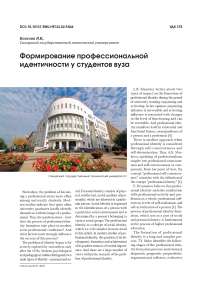Formation of professional identity among students (in English)
Автор: Vlasova Irina V.
Журнал: Высшее образование сегодня @hetoday
Рубрика: Дидактика высшей школы
Статья в выпуске: 2, 2023 года.
Бесплатный доступ
The question of the need to form a professional identity among students of technical specialties is being investigated. The analysis of psychological and pedagogical literature on the research problem was carried out. It is concluded that professional identity is one of the main components of self-consciousness and the most sought-after type of identity, its formation is necessary in the process of obtaining higher professional education and is influenced by psychological, social and pedagogical factors. The conditions for the formation of professional identity are formulated.
Higher professional education, self-awareness and self-development of students, professional identity, educational environment, personal identity
Короткий адрес: https://sciup.org/148326549
IDR: 148326549 | УДК: 378 | DOI: 10.18137/RNU.HET.23.02.P.044
Текст научной статьи Formation of professional identity among students (in English)
Самарский государственный технический университет
Формирование профессиональной идентичности у студентов вуза
Самарский государственный технический университет
Nowadays, the problem of becoming a professional arises more often among university students. Modern studies indicate that quite often university graduates hardly identify themselves with the image of a professional. Thus, the question arises - how does the process of professional identity formation take place in modern socio-professional conditions? And what factors most strongly influence the success of this process?
Tie problem of identity began to be actively explored by researchers only after the 1970s. Modern psychological and pedagogical studies distinguish two main types of identity - personal and so- cial. Personal identity consists of physical, intellectual, moral qualities of personality, which are inherent in a particular person. Social identity is expressed in the identification of a person with a particular social environment and is determined by a person’s belonging to various social groups. Tie professional identity as a subtype of social identity, which we will consider in more detail in this article. In modern studies of professional identity, the question of its development, formation and achievement of its positive status is of central importance. And there are a large number of views within the research of the problem of professional identity.
L.B. Shneider writes about two types of impact on the formation of professional identity during the period of university training: organizing and activating. In her opinion, organizing influence is irreversible and activating influence is associated with changes in the level of functioning and can be reversible. And professional identity manifests itself in existential and functional fusion, correspondence of a person and a profession [8].
There is another approach when professional identity is considered through self-consciousness and self-determination. Thus, A.K. Markova, speaking of professionalism, singles out professional consciousness and self-consciousness as components. From her point of view, the concept “professional self-consciousness” coincides with the definition of the concept “professional identity” [4].
P. Povarenkov believes that professional identity includes satisfaction with professional activity and profession as a whole, professional selfesteem, levels of self-realization and self-actualization of a person [5]. The process of professional identity formation, which acts as a part of social and personal identity, is fundamental in the process of higher professional education.
The formation of professional identity is a long and complex process. T.Y. Skibo identifies the following stages of the professional identity formation process: motivational, diagnostic, prognostic, propaedeutic, organizational, reflexive, evaluative
ВЛАСОВА И.В.
ФОРМИРОВАНИЕ ПРОФЕССИОНАЛЬНОЙ ИДЕНТИЧНОСТИ У СТУДЕНТОВ ВУЗА

ВЛАСОВА ИРИНА ВЛАДИМИРОВНА
Российская Федерация, город Самара
IRINA V. VLASOVA
Samara, Russian Federation
and states that in educational organizations special attention should be paid to the propaedeutic stage, during which the teacher must determine the degree of the personal and professional readiness to create the necessary conditions for the formation of professional identity of students [6].
I.N. Kulezneva writes about the formation of professional identity in the conditions of applied professional activity and notes that the future profession sets some reference points for the formation of professional identity. She allocates two periods of formation of professional identity: pre-pro-fessional connected with the period of training in the educational organization and professional [3]. G.V. Garbuzova singles out several stages at which the educational organization “accompanies” the formation of students’ professional identity: adaptation, self-determination, professionalization [1].
From L.M. Fedotova’s point of view, the process of professional identity formation includes the following: self-knowledge and self-consciousness of students in future professional activity at the moment of educational process; definition by students during educational process of their own life and professional goals and perspectives; creation of necessary conditions for disclosure of students’ abilities, actualization of needs in mastering professional knowledge, abilities, skills and competencies, needs in students’ independent solution of professionally oriented tasks and problems [7]. Also, she notes that the formation of professional identity is a purposeful process of students’ conscious activity in mastering professional knowledge, which is manageable and, as a result, mastering certain professional functions and roles, reflecting the unity of ideas about themselves and attitude to themselves as a professional.
Having analyzed the works of different researchers it was possible to formulate the following conditions of students’ professional identity formation in the process of higher professional education: specially organized educational environment in the university, considering the opportunities and interests of students; close connection between theoretical knowledge obtained in the process of learning and its application in the course of practical, professional activity; sufficient number of study hours for forming practical skills; independent professional recognition of priority of interests and needs of students by all participants of educational process; introduction of students to the values of professional community; consistency of educational impacts in educational organization; teachers’ competence in the field of formation of students’ professional identity; creation of environment for activation and implementation of professional and creative self-development process of students’ personality; availability of feedback for correction.
N.A. Isaeva notes the fact that in the formation of professional identity there is an acute contradiction between the received knowledge and specific professional activity. As a consequence, professional identity is formed on the basis of theoretical knowledge, values, idealized perceptions of the profession, but when actually entering into professional activity, the young professionals are not ready to apply their previously acquired knowledge and competences. It is extremely important for representatives of technical professions to have a successfully formed professional identity. Their progress and effectiveness in professional activities will depend much on it [2].
Te analysis of the psychological and pedagogical literature on the problem of research allows us to draw the certain conclusions about the need for the formation of professional identity among students of technical universities in modern conditions of development of society. More specific, professional identity is one of the main components of self-consciousness and undergoes changes throughout a person’s life. Constant changes in the social, economic and political spheres of human life and society lead to changes in social roles and requirements for the organization of activities. In general terms, the process of professional identity formation, which acts as a part of social and personal identity, is fundamental in the process of higher professional education and is influenced by psychological, social and pedagogical factors. Tey can be divided in such a way:
-
• psychological: interests, abilities, level of learning motivation, character, temperament, features of the nervous system, state of mental health;
-
• social: worldview, place of residence, professional experience, influence of teachers, professional experience of parents, level of theoretical and practical training.
At the same time, it is necessary to observe certain psychological and pedagogical conditions for successful formation of students’ professional identity.
Список литературы Formation of professional identity among students (in English)
- Гарбузова Г.В. Студенческое самоуправление как средство формирования профессиональной идентичности будущих специалистов: автореф. дис.. д-ра пед. наук. Ярославль, 2008. 32 с.
- Исаева Н.А. Профессиональные интересы и представления студентов как компонент педагогической деятельности // Формирование компонентов педагогической деятельности будущих учителей в курсах педагогики и психологии: сборник научных трудов. Тула, 1988. С. 41-47.
- Кулезнева И.Н. Развитие профессионального самосознания студентов в условиях среднего профессионального образования: автореф. дис. канд. пед. наук. Ярославль, 2008. 22 с.
- Маркова А.К. Психология профессионализма. М., 1996. 308 с.
- Поваренков Ю.П. Проблемы профессионального становления личности. Саратов: СГСЭУ, 2012. 325 с.
- Скибо Т.Ю. Педагогические условия формирования профессионально-личностной идентичности студентов колледжа: автореф. дис. д-ра пед. наук. Воронеж, 2004. 23 с.
- Федотова Л.М. Формирование профессиональной идентичности студентов в процессе обучения в вузе: авто-реф. дис. канд. психол. наук. Кемерово, 2011. 24 с.
- Шнейдер Л.Б. Профессиональная идентичность. М., 2001. 256 с.


